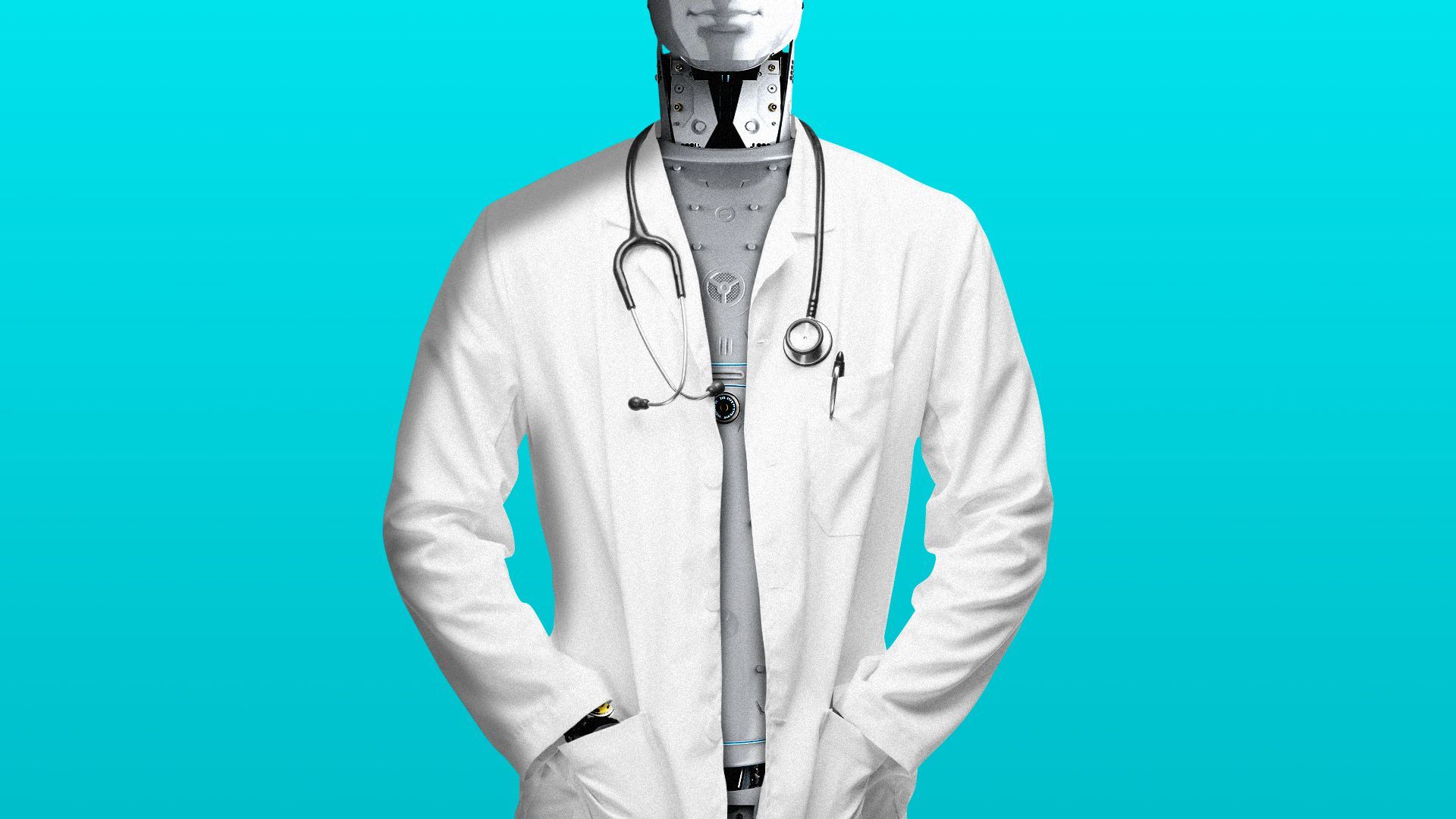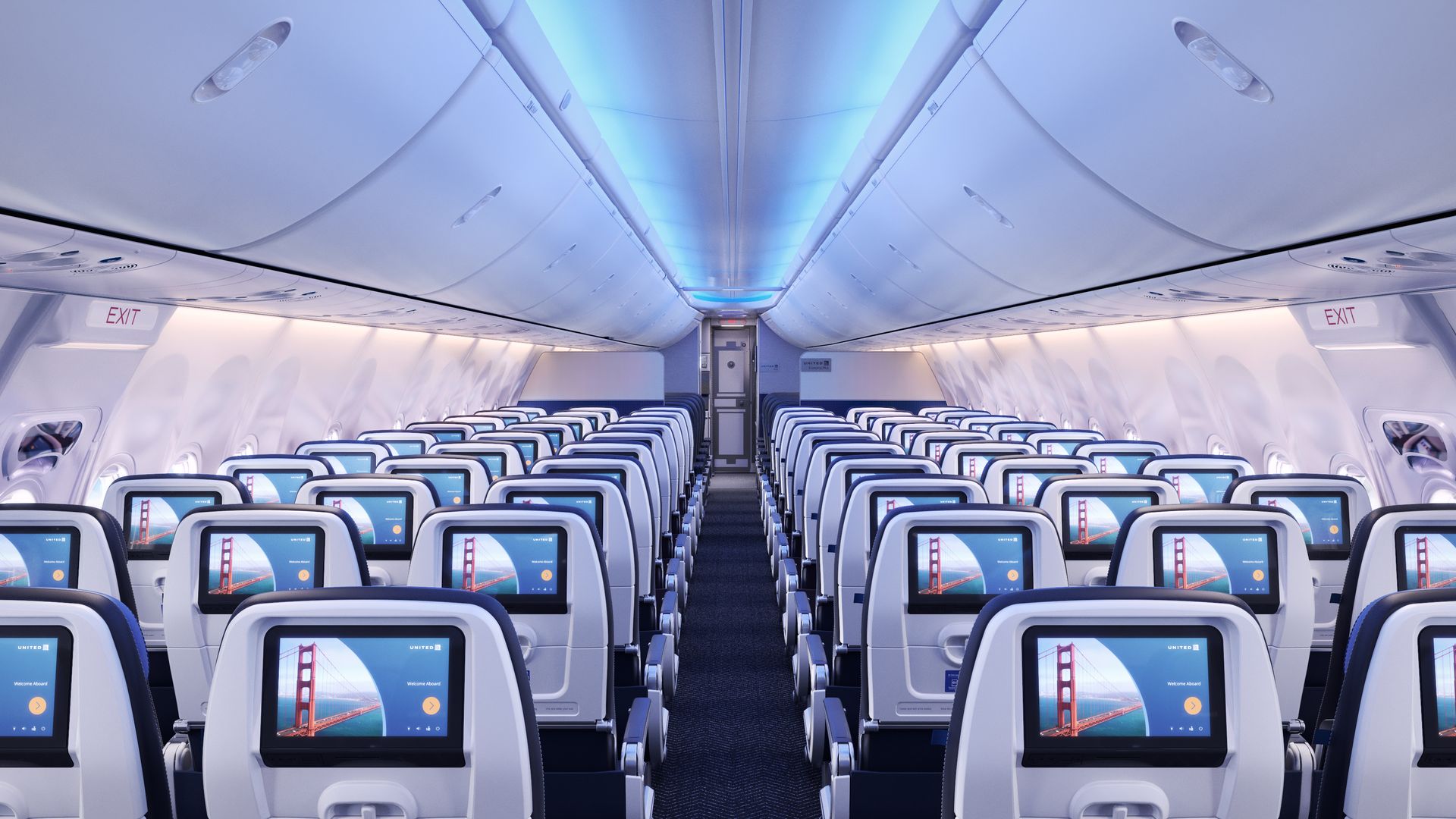| | | | | | | Presented By General Motors | | | | Axios What's Next | | By Bryan Walsh ·Jun 29, 2021 | | Today it's about AI ethics in health care, co-working spaces that feel like spas, and lots and lots of planes. "What was next" trivia: On this day in 1972, what criminal penalty did the Supreme Court ban — before overruling itself four years later? ⚖️ - Credit to reader Skylar Cohen for being the first to note yesterday's answer: Archduke Franz Ferdinand.🇦🇹
- Send your answer, along with tips and feedback, to whatsnext@axios.com.
🎤 We'll be talking about the future of work and transportation today on Twitter Spaces at 1PM ET — join us here. Today's Smart Brevity count: 1,199 words ... 4.5 minutes. | | | | | | 1 big thing: A Hippocratic Oath for your AI doctor |  | | | Illustration: Aïda Amer/Axios | | | | A broad new report from the World Health Organization (WHO) lays out ethical principles for the use of artificial intelligence in medicine, writes Bryan Walsh. Why it matters: Health is one of the most promising areas of expansion for AI, and the pandemic only accelerated the adoption of machine learning tools. But adding algorithms to health care will require that AI can follow the most basic rule of human medicine: "Do no harm" — and that won't be simple. Driving the news: After nearly two years of consultations by international experts, the WHO report makes the case that the use of AI in medicine offers great promise for both rich and poorer countries, but "only if ethics and human rights are put at the heart of its design, deployment and use," the authors write. Between the lines: The power of AI in health care is also its peril — the ability to rapidly process vast quantities of data and identify meaningful and actionable patterns far faster than human experts could. - When it works, AI holds the promise of helping human clinicians provide better and cheaper care — as in a project that uses AI to rapidly scan for cervical cancer in under-resourced parts of Africa and India.
- But if something goes wrong, a mistake in a single algorithm risks doing far more widespread harm than any single doctor might do. In a recent study, an algorithm used to identify cases of sepsis was found to miss two-thirds of cases while frequently issuing false alarms.
The big picture: To get the most out of AI in medicine while minimizing harm, the WHO report lays out a kind of "Hippocratic Oath" for artificial practitioners of the medical arts. - The principles include that humans — both clinicians and patients — remain the ultimate decision-makers in medicine, AI in health primarily "does no harm" and any recommendations or actions by AI remain transparent and explainable.
- AI technologies should be clearly accountable for patient outcomes, engineered to be usable to the widest possible population and designed to ensure they actually work in real-world conditions — not just in trials.
The catch: Not unlike the modern Hippocratic Oath — all of 340 words — outlining the principles of responsible AI use in health is a lot easier than putting them into practice. The bottom line: Few professional relationships require more trust than that between a clinician and their patient, and medical AI still needs to earn that trust. Read the rest. |     | | | | | | 2. United's CEO bets travel will "come back 100%" |  | | | United Airlines will feature more legroom, seat-back entertainment and faster WiFi. Photo courtesy of United Airlines | | | | United Airlines just placed the biggest aircraft order in its history and expects to create 25,000 unionized jobs by 2026 in an effort to capitalize on the astonishing rebound in passenger travel, Joann Muller writes. Why it matters: This is one of those "go big or go home" moments for the airline industry, which was devastated by pandemic-related travel restrictions worldwide. Domestic leisure travel has bounced back, but business and international travel remain depressed, making United's plan a significant bet on future growth. What they're saying: "Everything we see, every day, tells us that business and international travel will ultimately come back 100%," United CEO Scott Kirby told reporters late Monday. - "What you're seeing in the marketplace is that as people travel more for leisure, the resistance to traveling for business is rolling back quickly," added chief commercial officer Andrew Nocella. That will only accelerate in the fall after kids go back to school in much larger numbers, he said.
- "Next summer, travel across the Atlantic is going to be an absolute record-breaker," Nocella predicted.
Details: United announced the purchase of 270 new Boeing and Airbus aircraft — its biggest ever, and the largest by any carrier in the past decade. - Combined with previous orders, United plans to take delivery of 500 new planes between now and 2026, replacing at least 200 smaller regional jets with larger aircraft.
- The fleet overhaul means United will increase the total number of available seats across its domestic network by almost 30% per departure.
Flying should become more pleasurable as a result, with more premium seats available in first class and economy plus, giving passengers the opportunity to upgrade with more legroom, said chief customer officer Toby Enqvist. Read the rest. |     | | | | | | 3. Co-working spaces prioritize "wellness" as well as WiFi |  | | | A conference table at The Ring in Clearwater, Florida. Photo: Kim Hart / Axios | | | | CLEARWATER, Florida — A co-working space called The Ring is taking the healthy workplace concept up a notch, writes Kim Hart. Why it matters: As people return to work after the pandemic, some office spaces are betting that workers would prefer to spend their days in health-conscious spaces. What they're saying: "Our goal is to be the world's healthiest co-working space," says Christopher Murphy, community manager at The Ring, which occupies two floors of an 11-floor building in downtown Clearwater. - The co-working space is aiming to get a WELL Certification, a relatively new standard that certifies buildings for prioritizing occupants' well-being through core areas such as air, water, light, nourishment and fitness.
Details: Conference rooms and elevator banks all have plants — living or preserved moss and hanging ferns — to filter the air. Murray claims the air quality is higher than what you'd find in most hospitals. - To keep the air fresh in individual offices, occupants must use trash cans and printers in common areas. A specialized ventilation system immediately whisks away the air in the communal "printing room" when a print job is done, removing harmful chemicals from the air.
- Rooms are equipped with special lighting designed to reinforce occupants' circadian rhythms. Natural light pours in through large windows. Cork walls absorb excess sound.
- Aromatherapy is optional, and a napping pod is a popular feature.
Read the rest. |     | | | | | | A message from General Motors | | Progress moves when everybody's in | | |  | | | | General Motors is investing $35 billion globally in EVs and AVs through 2025 and providing access to nearly 60,000 places to charge across the U.S. and Canada. Why it's important: By creating a seamless charging experience, GM's investment is electrifying the future. | | | | | | 4. The global march of electric vehicles |  Data: Wood Mackenzie; Chart: Axios Visuals Projections from the consultancy Wood Mackenzie see battery electric vehicles growing to 56% of global sales by midcentury as internal combustion models see their share greatly erode, writes Ben Geman. The big picture: It estimates there will be 875 million electric passenger vehicles and 70 million electric commercial vehicles on the roads by 2050. The latest analysis of passenger and commercial markets boosts its estimate of fully electric vehicles' share compared to even a February projection, which had it at 48%. What they're saying: "A growing list of countries and automakers are committing to carbon-neutral targets, and this has completely transformed the global road transport landscape," Wood Mackenzie analyst Ram Chandrasekaran said in a statement. Yes, but: Long-term outlooks are stuffed with uncertainties. - And despite rapid growth, the International Energy Agency warns that EV adoption isn't on pace to meet Paris climate agreement goals.
- The IEA's recent analysis of what's needed to reach net-zero global emissions by 2050 would have EVs at 60% of passenger car sales by 2030(!).
Read the rest. |     | | | | | | 5. What they're saying |  | | | Serena Williams waves goodbye to spectators at the French Open on June 6. Photo: Tim Clayton/Corbis via Getty Images | | | | I haven't really thought about it, so I'm going to keep not thinking about it. — Tennis legend Serena Williams, telling reporters that she won't be participating in the Tokyo Olympics this summer (and inadvertently capturing the burnt-out, post-pandemic feelings of everyone who would prefer not to think about what they're supposed to do next). |     | | | | | | A message from General Motors | | Progress moves when everybody's in | | |  | | | | General Motors is investing $35 billion globally in EVs and AVs through 2025 and providing access to nearly 60,000 places to charge across the U.S. and Canada. Why it's important: By creating a seamless charging experience, GM's investment is electrifying the future. | | | | Thanks for reading! If this email was forwarded to you, subscribe here! |  | | It'll help you deliver employee communications more effectively. | | | | | | Axios thanks our partners for supporting our newsletters. If you're interested in advertising, learn more here.
Sponsorship has no influence on editorial content. Axios, 3100 Clarendon Blvd, Suite 1300, Arlington VA 22201 | | | You received this email because you signed up for newsletters from Axios.
Change your preferences or unsubscribe here. | | | Was this email forwarded to you?
Sign up now to get Axios in your inbox. | | | | Follow Axios on social media:    | | | | | |









No comments:
Post a Comment